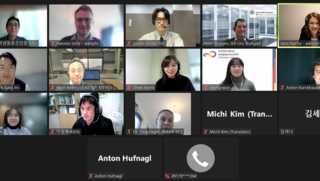WG1 Expert Workshop on "Heat Pumps in the Energy Transition"

On November 21st and 22nd, an expert workshop on heat pumps in the energy transition was conducted as part of the "Energy Efficiency" series within the Korean-German Energy Partnership. In this format, policymakers, industry experts and researchers discussed the state of regulation, exchanged on supportive measures and discussed strategies for heat pump deployment in each country.
The first part took place as a closed meeting within the Energy Transition working group. To start, Dr. Tina Flegel (Federal Ministry for Economics and Climate Action) and Jung Jin Park (MOTIE) presented the expansion status of heat pumps as well as associated regulations and policy goals in Germany and Korea. This was followed by an input from Dr. Peter Radgen (University of Stuttgart) on the role of heat pumps in industry. Anton Barckhausen (adelphi) and Hee Jeong Kang (Korea Refrigeration and Air-Conditioning Assessment Center) then joined the following open discussion which focused on possible use cases for heat pumps in industry, the need for demand management measures and how to support their expansion and further technological development.
On the second day, the role of heat pumps as a central technology for decarbonization was discussed in an open webinar. Johanna Otting (Bundesverband Wärmepumpe (BWP) e. V.) started the event with an overview of recent legislative changes in Germany and the resulting market dynamics for heat pumps. Next, Jeong Sik Seo (KRAAC) introduced different types of heat pumps and their role for Korea’s transition. Markus Blesl (University of Stuttgart), presented insights from research projects investigating the potential of the use of large-scale heat pumps (LSHP) in Germany’s existing district heating networks, pointing out upfront investment costs and the uncertain funding situation as barriers to adoption. Gil Bong Lee (Korea Institute of Energy Research) spoke about the status of LSHP in Korea and remarked that the Korean market needed further policy instruments for their promotion. Then, Dr. Marek Miara (Fraunhofer-Institut für Solare Energiesysteme ISE) presented how heat pumps are an increasingly interesting option not only for residential but also industrial heating needs. Chan Ho Song (Korea Institute of Machinery & Materials) closed the workshop with an overview on the state of research regarding (high temperature) heat pumps in Korea.
The workshop showed that despite the differences between the countries in heat pump adoption, topics like peak demand management through digitalization and increasing industrial use cases for heat pumps present interesting opportunities for future cooperation between Korea and Germany.
The event was jointly organized by the AHK Korea (Korean-German Chamber of Commerce and Industry), the Korean Energy Technology Evaluation and Planning (KETEP) and adelphi. It was co-moderated by Jun Ho Oh (KETEP) and Jana Narita (adelphi).